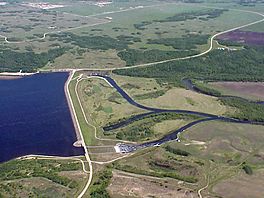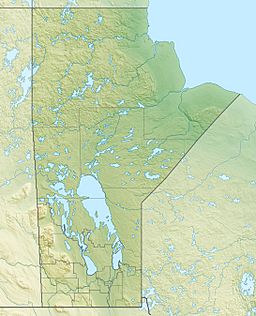Shellmouth Reservoir facts for kids
Quick facts for kids Lake of the Prairies |
|
|---|---|

Shellmouth Dam
|
|
| Location | R.M. of Shellmouth-Boulton / R.M. of Shell River, Manitoba and Cote No. 271, Saskatchewan |
| Coordinates | 51°08′40″N 101°30′19″W / 51.14444°N 101.50528°W |
| Type | reservoir |
| Primary inflows | Assiniboine River, Shell River (Saskatchewan), Cupar Creek |
| Primary outflows | Assiniboine River |
| Basin countries | Canada |
| Max. length | 56 km (35 mi) |
| Surface area | 61.5 km2 (23.7 sq mi) |
| Water volume | 480×106 m3 (390,000 acre⋅ft) |
| Surface elevation | 425 m (1,394 ft) |
The Shellmouth Reservoir (also known as Lake of the Prairies) is a man-made reservoir on the Assiniboine River in Manitoba and Saskatchewan, Canada.
The Shellmouth Dam (50°57′49″N 101°25′07″W / 50.96361°N 101.41861°W) is an embankment dam built by the Prairie Farm Rehabilitation Administration (PFRA). Construction started in 1964 and was completed in 1972 costing CDN $10.8 million. The dam is 70 feet (21 m) high and 4,200 feet (1,300 m) long. The reservoir is 35 miles (56 km) in length and stores 390,000 acre feet (480 million cubic metres) at the spillway crest level of 1,408.5 feet (429.3 m). Outflows are controlled by a gated conduit and a 210-foot (64 m) wide concrete chute spillway. The normal summer level target is between 1,400 feet (430 m) and 1,404 feet (428 m).
The dam and reservoir are part of a strategy to reduce the risk of flooding on the Assiniboine River and in Winnipeg. For example, in the 1997 Red River flood, the inflow to the reservoir peaked at 10,000 cubic feet per second (280 m3/s) while the outflow never exceeded 1,700 cu ft/s (48 m3/s). The reservoir is also used to supplement flows on the Assiniboine when conditions are dry ensuring water supply for Brandon, Portage la Prairie, irrigators and some industries.
The reservoir is also known by the name "Lake of the Prairies". Asessippi Provincial Park is established around the southern arm of the lake.
Fish species
Fish species include walleye, yellow perch, northern pike, mooneye, burbot, rock bass, brown bullhead, white sucker, shorthead redhorse and common carp. Rock bass are Saskatchewan's only native bass.
Gallery







